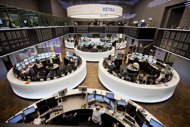European stocks mixed on Greek bailout delay

London's benchmark FTSE 100 index ended the day down 0.13 per cent at 5,892.16 points, but in Frankfurt the DAX 30 added 0.44 per cent to 6,757.94 points and in Paris the CAC 40 also gained 0.44 per cent to close at 3,390.35 points.
The single currency meanwhile slid to $1.3085 from $1.3134 late in New York on Tuesday.
Wall Street opened higher on positive new reports on manufacturing as well as signals from China of support for Europe to help with its debt crisis, but by midday the Dow Jones Industrial Average was down 0.18 per cent to 12,855.19 points.
The broad-based S&P 500 added 0.36 per cent to 1,355.42 points, while the Nasdaq Composite climbed 0.81 per cent to 2,955.64 points.
The US equity markets moved to the upside "following an upbeat US regional manufacturing report, and comments from China that it is ready to play a larger role in solving the eurozone debt crisis," Charles Schwab analysts said.
In a separate report, the Fed said US industrial production rose 0.7 per cent in January from December, with solid manufacturing output growth offset by unseasonably warm winter weather that lowered heating demand from utilities.
Chinese Premier Wen Jiabao said Tuesday that the Asian powerhouse may use its massive foreign exchange reserves to help Europe, its biggest export market.
People's Bank of China governor Zhou Xiaochuan added Wednesday that China was ready to get more involved in efforts to resolve Europe's debt crisis.
"As Premier Wen Jiabao said yesterday at the China-EU summit, China will... continue to invest in European government bonds and will continue... to get more involved in solving the European debt crisis," Zhou said.
Meanwhile, official data showed Wednesday that the eurozone sovereign debt crisis brought economic growth across the euro area to a standstill in the fourth quarter and even pushed a number of countries into recession.
But investors were partly comforted by better-than-expected gross domestic product (GDP) data in Berlin and Paris. The French economy grew by 0.2 per cent in the fourth quarter, while the German economy shrank by just 0.2 per cent.
"Despite visible signs of economic slowdown in Europe, as the fiscal belt tightening does not necessarily foster growth, and (the) Greece issue, markets were able to open higher," said Gekko Global Markets analyst Anita Paluch.
"The GDP data may not be that bad at all, pointing rather to a stabilisation at lower levels than to continuous contraction, and China is willing to lend a helping hand by expanding its investments in Europe.
"Investors see past Greece as well -- as the country did not provide on time written commitments necessary in the run up to the bailout meeting, it got punished."
Greece desperately needs the 230-billion-euro rescue package -- 130 billion euros in fresh loans and a 100-billion-euro write down on privately-held bonds -- to avoid defaulting on almost 14.5 billion euros in debt owed on March 20.
Eurozone finance ministers scrapped a meeting on Wednesday after Athens failed to meet conditions for the bailout.
Instead the ministers, who must sign off on the bailout, held a conference call beginning at 1600 GMT. Sources said no decisions would likely be taken, with the ministers set to meet on Monday.
Greek Finance Minister Evangelos Venizelos had pledged the conditions would be met by the conference call.
The European Union wants Athens to plug a 325-million-euro hole in its budget and demands written commitments from the two coalition leaders backing Prime Minister Lucas Papademos' government that the reforms will continue after snap elections are held, most likely in April.
Socialist leader George Papandreou and conservative leader Antonis Samaras each sent their written pledges on Wednesday, with the latter saying his front-running party would "remain committed to the objectives, targets and key policies" described in the economic recovery programme if it wins.
Asian markets were mostly higher Wednesday, despite disappointing US retail data and Greek jitters.
What the stars mean:
★ Poor ★ ★ Promising ★★★ Good ★★★★ Very good ★★★★★ Exceptional
 Tag:
Tag:
Related Contents
Latest News
More News
- Cashless payments hit 28 times GDP in 2025 (February 04, 2026 | 18:09)
- SSIAM and DBJ launch Japan Vietnam Capital Fund (February 04, 2026 | 15:57)
- Banks target stronger profits, credit growth in 2026 (February 04, 2026 | 15:43)
- Vietnam on path to investment-grade rating (February 03, 2026 | 13:07)
- Consumer finance sector posts sharp profit growth (February 03, 2026 | 13:05)
- Insurance market building the next chapter of protection (February 02, 2026 | 11:16)
- NAB Innovation Centre underscores Vietnam’s appeal for tech investment (January 30, 2026 | 11:16)
- Vietnam strengthens public debt management with World Bank and IMF (January 30, 2026 | 11:00)
- Corporate bond market poised for stronger growth cycle (January 28, 2026 | 17:13)
- Vietnam's IPO market on recovery trajectory (January 28, 2026 | 17:04)






















 Mobile Version
Mobile Version